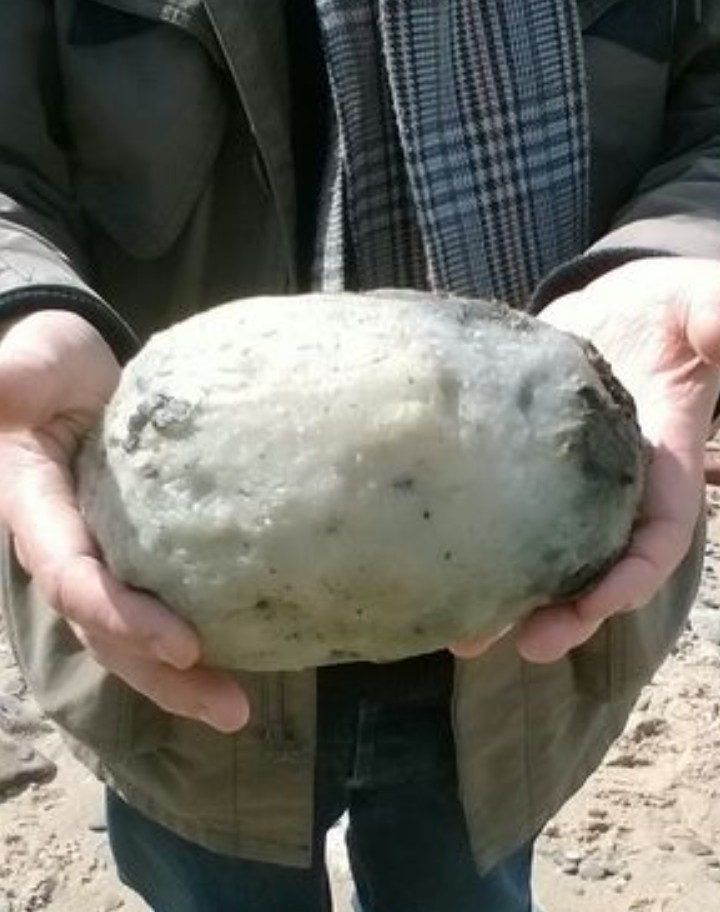Gary and Angela Williams, a couple from Overton, Lancashire, were taking a casual walk along Middleton Sands beach near Morecambe Bay when an unpleasant odor in the air caught their attention. The smell was strong and foul, reminiscent of rotting fish, and their curiosity led them to follow it along the sand.

Eventually, they stumbled upon an unusual-looking “stone” resting along the shoreline. The odd lump immediately reminded them of something they had read about in a newspaper—ambergris, also known as “whale vomit,” a rare and valuable substance used in the production of high-end perfumes. Realizing the potential significance of their find, the couple wrapped the object carefully in a scarf and brought it home for closer inspection. Gary, who works as an engineer, placed the lump on his fishing scales and discovered that it weighed 1.57 kilograms, which is a little over half the size of another piece found several years earlier in the same region.
That earlier discovery, made in 2013, had been valued at an astonishing £120,000. Angela, a 49-year-old nurse, and Gary, 48, are now in contact with prospective buyers and considering their options. The lump they found is slightly smaller than a rugby ball but could still be worth a significant sum—possibly around £50,000. Ambergris forms inside the digestive system of sperm whales and is often referred to as “floating gold” because of its rarity and the high prices it commands from perfume makers.
It develops over many years as a hardened intestinal substance, believed to help protect the whale’s stomach and intestines from sharp objects such as squid beaks, which are part of its diet. Once expelled by the whale, ambergris can float in the ocean for decades before eventually washing ashore. During its time at sea, the material hardens and changes, gradually becoming a smooth, waxy, grey lump through exposure to saltwater and sunlight. Gary described the moment they realized what they might have found as “a bit of a shock.” The section of beach where they discovered it is not often visited by walkers, which made the find even more surprising.
Despite its potentially high value, Gary admitted that the ambergris had an incredibly strong and unpleasant odor. “It smells awfully nasty,” he said, “like a cross between farm manure and squid.” He also described its texture as being similar to a very hard rubber ball with a waxy, candle-like surface that leaves a residue on your fingers when you touch it. The couple, who enjoy searching the beach for unusual items during their walks, couldn’t believe their luck. Gary mentioned that if the lump turns out to be genuine and valuable, the money would go a long way toward helping them achieve one of their dreams—purchasing a static caravan, something they have wanted for a long time.
The piece of ambergris they found has been stored safely since they brought it home, and they have already consulted with two experts to verify its authenticity—one based in France and another in New Zealand. Their careful approach reflects the rarity and high stakes involved in confirming such a find. The 1.57-kilogram chunk may be smaller than the 2.7-kilogram piece discovered in Morecambe in 2013, but given that experts valued that earlier find at up to £120,000, their discovery could still be worth tens of thousands of pounds. Ambergris remains one of the most prized natural substances in the perfume industry, valued for its ability to stabilize scent and help fragrances last longer.
Its rarity comes from the fact that it is produced by only a small percentage of sperm whales and can take decades to form, making each piece a rare occurrence. For Gary and Angela, what began as a simple walk along the beach turned into a potentially life-changing discovery. From following the pungent scent of what they initially thought was just rotting fish to uncovering what could be a lump of “floating gold,” their story is a reminder of how unexpected treasures can be found in the most unlikely places. Now, as they wait for confirmation and potential offers, they can’t help but dream about how this remarkable find might transform their lives.





